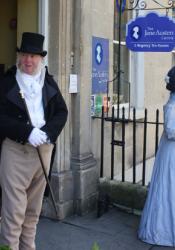Jane Austen's time in Bath
So much of what we know about Jane Austen's opinion of her time in Bath is colored by her negative comments of it in letters and her writing. Indeed, even my first COVE post for Bath on the map talked about the different experiences for Jane in Bath from when she visited versus when she lived there with her parents. But I found an interesting article that goes into a lot of the contradictions of Jane saying she hated Bath related to some of her experience there.
First, it should be noted that her move to Bath in 1801 was a decision by her parents who were retiring there, in part because of her mother's health needs. At first she was horrified, and Jane Austen scholars know that this makes sense given the general themes of home, smaller village life and a general distrust of city life in her writing. But as the Jane Austen scholar Paula Bryne points out, "Austen’s residence in Bath in the years 1801-06 coincided with one of the most prosperous and exciting times in the history of the local stage" (17). But not just with the stage, but with the culture there in general. While Austen was critical of the stage (we can see this in Mansfield Park), Bryne points out all the mentions in letters and journals by Austen that she often went to the theater and even had a favorite actor.
Some of the aspects of Bath during that time can be found in the newspapers of the time. Forgive the longer quotation, but I find it helps color what Bath was like during this time for Austen. "Amongst the advertisements for tooth whitening, false hair, lotions for the face to reduce freckles, muslin dresses trimmed with lace; between the countless medical cures for rheumatism, gout, sprains, bruises, and women’s ailments (the celebrated Cordial of Balm of Gilead, curing wind in the stomach and the bowels, and all nervous complaints), [Jane] would discover an array of enticing urban pleasures for the discerning tourist or civilized inhabitant. Tickets for the Assembly rooms were on offer, boxes at the Theatre Royal, musical concerts, and of course the pleasure gardens with fireworks and illuminations" (16). Between all of that and the balls, it's clear that Bath was the social center of society for a lot of people.
But how are we supposed to truly see Jane's experience when we have accounts like these: “Here I am once more in this Scene of Dissipation & vice, and I begin already to find my Morals corrupted” (17), but also like this (referring to her favorite stage actor perhaps leaving Bath and being quite worried about it): "Elliston . . . has just succeeded to a considerable fortune on the death of an Uncle. I would not have it enough to take him from the Stage" (18). I argue that we can see how she truly feels with her writing. Home and leaving home is a major theme in many of her novels, and while there does seem to be genuine enthusiasm behind Catherine's love of Bath in Northanger Abbey, her later works and how they often view moving around as a lack of stability. Indeed, Susan Morgan argues that this reflects Jane's life, in that her moving to Bath and then moving around quite a bit with her mother after her father's death wasn't ideal. She says, "all this changing around hardly adds up to a stable, in the sense of settled and static, domestic universe as the geographic setting of Austen’s work" (2). Given that much of the drama of her works lies in the nuances of the more settled domestic universe, it's clear to see that while Jane may have found Bath exciting and diverting, there may not be as much time for nuance either.
Works cited:
Byrne, Paula. “‘The unmeaning luxuries of Bath’: Urban Pleasures in Jane Austen’s World.” Persuasions 26 (2004): 13-26.
Morgan, Susan. “Adoring the Girl Next Door: Geography in Austen’s Novels.” Persuasions On-Line 21.1 (2000).

